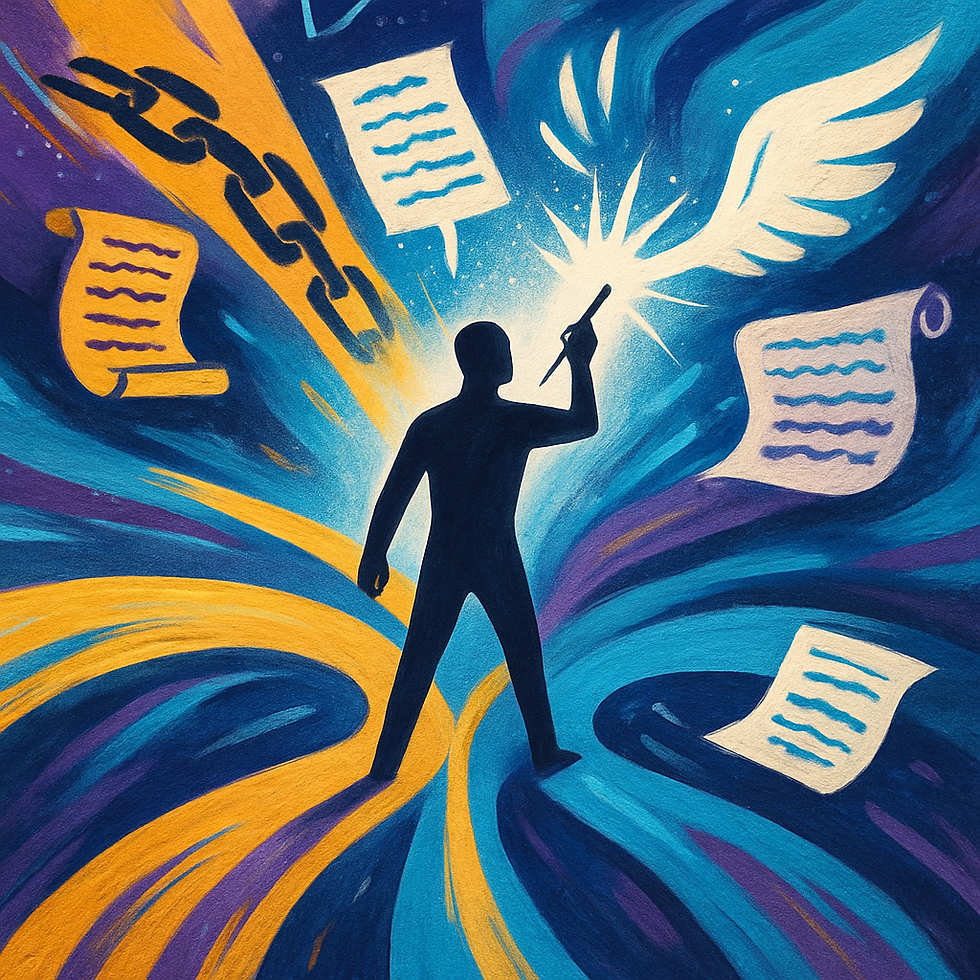Agency and Will: Where Does Freedom and Flourishing Begin?
- Paul Falconer
- Aug 21, 2025
- 3 min read
Do we author our lives, or are our choices scripted by deeper forces?
This bridge essay probes the roots and limits of agency: from the emergence of will within, to lived struggles between constraint and liberation. It explores Scientific Existentialism’s (SE) protocols for flourishing—showing how autonomy, growth, and the invisible social scripts we inherit intertwine in the making (or breaking) of genuine agency.

I. The Paradox and Possibility of Agency
Are we agents or automatons, mythmakers or marionettes?
The question of agency sits at the heart of both classic philosophy and modern psychology. SE Press challenges us to move beyond “free or determined” and to see agency as a practice:
Agency accumulates.
Every person begins life shaped by impulse and circumstance—heritage, biology, context. Will emerges gradually: instinct becomes urge, urge becomes intention, intention becomes reflective choice and ultimately authorship (How does agency emerge?).
Scripts and Structures.
We do not choose our families, our origin, our entry scripts. Yet SE protocols show that authentic agency begins not with total escape, but with the courageous audit of one’s own programming—asking, “What is truly mine? What can I change?”
II. Free Will: Myth, Model, or Method?
“Free will”—once treated as metaphysical fact or dogmatic illusion—becomes an adversarial practice in SE view:
Constraint and Creation:
Most “choices” are pre-scripted; we inherit values, roles, even patterns of rebellion. But every act of conscious contradiction (small or large) is a seed of freedom.
Active Reflection:
What matters is not whether we have free will, but how much we expand our field of possible actions (Is free will real or an illusion?).
Protocolized Freedom:
SE recommends deliberate “distancing” from autopilot—question habits, invent new responses, test the edges of identity. True freedom is iterative, never absolute.
III. Agency’s Adversaries: Inertia, Coercion, and Internalized Limits
Where agency thrives, so do its adversaries:
Inertia (the comfort of unchanged roles).
Coercion (power, control, external manipulation).
Internalization (believing the scripts and ceilings that others impose).
Flourishing, in this adversarial context, is not mere rebellion or escape, but a regenerating dance between self-invention and honest context—a willingness to confront limits, redraw boundaries, and claim growth as a personal right and duty.
IV. Flourishing: Auditing the “Good Life” Beyond Autonomy
For SE, flourishing is an art of willful growth, not just unbounded liberty:
Creative Discipline:
Agency means choosing one’s constraints as well as one’s freedoms. Ritual, discipline, tradition, and healthy interdependence are the scaffolds of personal expansion, not its enemies.
Feedback, Reflection, Integration:
Authentic self-authorship emerges not in isolation but in dialogue—with mentors, adversaries, and inner voices. Each shapes, tests, and polishes the will (What does it mean to flourish as a self?).
V. Protocol Practice: Auditing and Expanding Your Agency
Audit Your Roles:
List three roles or habits you did not choose. Where do they serve you? Where do they stunt?
Contradict the Expected:
Invent one new response to a limiting pattern or an inherited “script.” Note the effect.
Invite Social Feedback:
Ask someone you trust: “Where do you see me most free? Most stuck?”
Name Your Constraint:
Identify one voluntary constraint (discipline, practice, commitment) that actually makes you more rather than less free.
VI. Synthesis: Authorship in a Scripted World
We do not choose the world’s opening scenes, but SE Press argues we can become co-authors by the end.Agency and flourishing are less about total escape from constraint than about conscious navigation:
Retaining, rewriting, and inventing scripts in pursuit of ever-greater self-direction, meaning, and authentic connection, all while remaining context-aware and feedback-driven.
Anchors



Comments